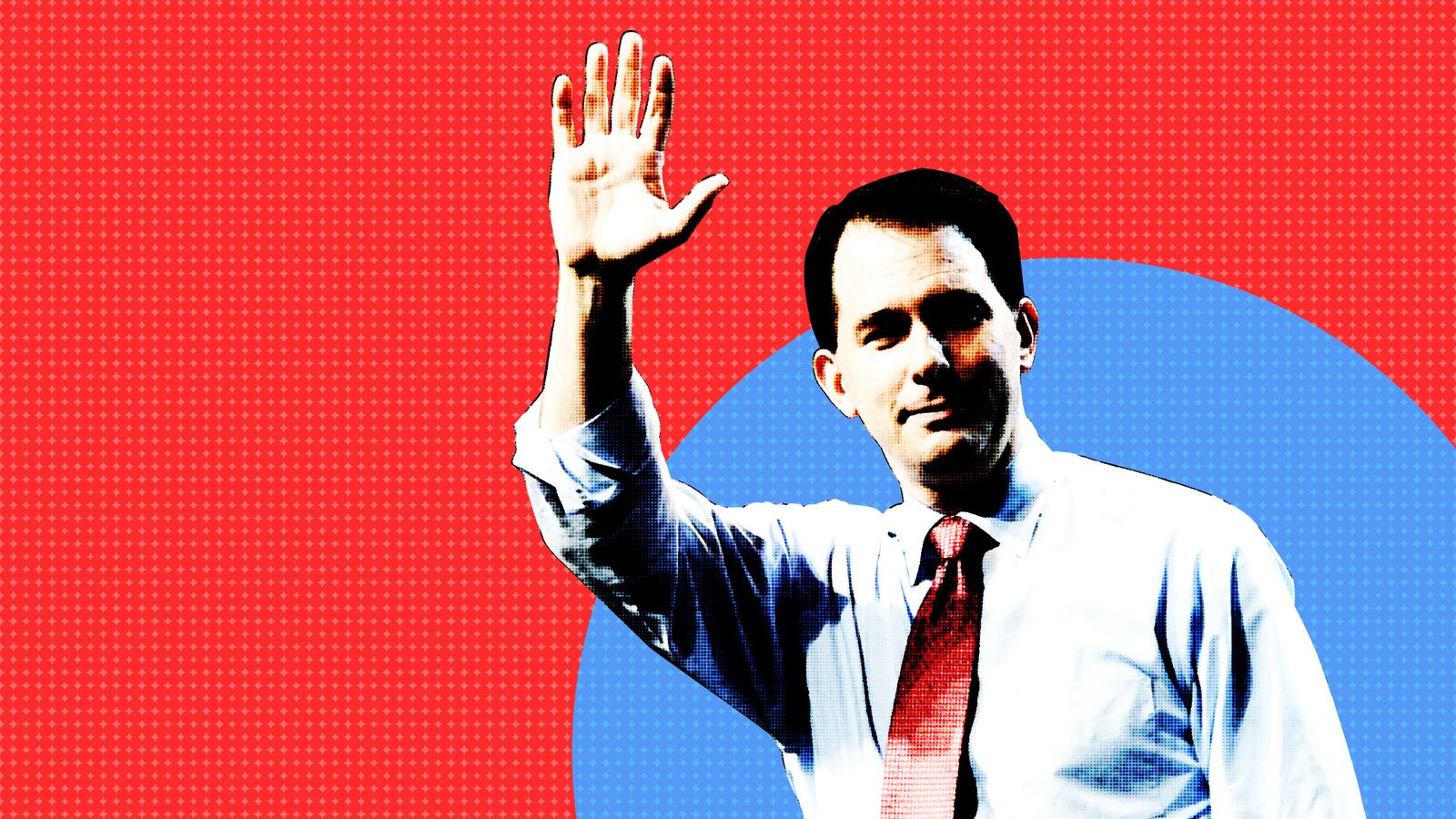It was discomfitingly similar to Lord of the Flies.
That’s how Charlie Sykes, one of the most influential conservative talk radio hosts in Wisconsin, described the state legislature’s efforts to pass a budget without the close involvement of conservative king Governor Scott Walker.
“Daddy was gone, the grown-up was gone,” Sykes said. “Walker had been setting the agenda and suddenly he was out of the picture.”
“It was sort of every man for himself,” he added.
As he kicks off his campaign on Monday, Walker is likely to discuss his record of “big, bold reforms” and the verve with which he took on “big-government special interests” in the Badger State.
And Wisconsinites on the right, on the whole, seem content and happy with the budget. But some home state conservatives find a few of his talking points a little funny, given the extent to which the state’s conservative legislature pushed him to the right and kept him there.
Walker ’16 has been a very long time coming, but in many ways, the delay was by design.
He promised he wouldn’t start running for president until his state’s budget passed—but that hairy process took about a month longer than expected.
And while some conservatives argue it took so long because of Walker’s shadow presidential campaign—they also took advantage of his absence.
When Walker released the state’s budget proposal in February, many conservative Wisconsinites had heart palpitations.
It included a big handout for a Hillary-Clinton-loving billionaire in the form of funds to build an arena for the Milwaukee Bucks, as well as a high level of borrowing to pay for transportation projects.
Conservatives in the state tell The Daily Beast that this left many of them scratching their heads.
Where were all the big, bold reforms Walker frequently touts to bring Iowa crowds to their feet? After all, the 2014 elections gave Assembly Republicans the biggest majority they’d had in that chamber since the Eisenhower administration. And Walker wanted to follow that election up with—this?
Thus began several WWE-esque smackdowns in the legislature.
And when the dust settled, the final budget had some significant differences from the proposal Walker first sent to the Capitol.
Republicans dramatically lowered the level of transportation borrowing, and added a provision eliminating the rule requiring that Wisconsin municipalities pay the “prevailing wage” to workers hired for their projects.
Sykes said credit for that particular change—which he would place squarely in the “big, bold reform” category—did not go to Walker.
Instead, the victory went to three state senators: Duey Stroebel, Stephen Nass, and Frank Lasee, who refused to vote for the budget unless it did more for the right.
Republicans’ majority in the Senate is small enough that groups of just three legislators can hold enormous sway, and Sykes says they did so quite successfully in this case.
That’s not to suggest Walker’s proposal didn’t have a lot for them to like, including a school choice expansion and no new or raised taxes. Under Walker’s watch, the state’s property tax level has been stubbornly frozen, and conservatives love him for it.
But conservative legislators are used to dreaming big, and Walker’s initial proposal wasn’t going to cut it.
“There was very clearly a leadership vacuum,” said Collin Roth, the managing editor of Right Wisconsin, pointing to Walker’s pre-presidential travel schedule as the source of said vacuum.
Sykes concurred.
“He’s had quite a travel schedule,” he said.
Still, after all that, conservatives seem to mostly agree that the final budget will be a boon for the governor’s presidential ambitions—and that it will be good for the state.
Walker’s office said they’re proud of the final product.
“We have worked closely with lawmakers throughout the process and will sign into law a budget that best serves Wisconsin’s citizens and continues to move Wisconsin forward,” said Laurel Patrick, a spokeswoman for the governor.
Other top Badger State conservatives are also happy with the outcome.
“The legislature did good work when it comes to the transportation bonding levels,” said Brett Healy, the president of the conservative think tank MacIver Institute. “But I just don’t know how you can look at Governor Walker’s record and somehow question that he’s a true fiscal conservative.”
Walker’s governorship certainly hasn’t been dominated by his legislature—the 20-week abortion ban on his desk was all his doing—but he was initially coy about some of the initiatives that he will likely celebrate on the campaign trail.
Take the legislation making Wisconsin a Right-to-Work state, which means employers can’t make payment of union dues a condition of employment.
Walker’s senior adviser, Rick Wiley, listed that policy change as an example of a time when Walker “bested” President Obama.
But home state conservatives roll their eyes a little bit at that.
“It’s very amusing,” said Roth. “You don’t have to look far in media quotes going back to November, December, January—he did not want that bill to get to his desk.”
Walker’s team says he hasn’t vacillated in his support for Right to Work legislation, and has only expressed concerns about timing. The state legislature ignored those concerns in March, when they moved ahead on the legislation, timing be damned.
“The two big initiatives this year, Right to Work and prevailing wage, were not Walker-initiated,” Sykes said. “He may take credit for them on the trail, but Right to Work passed in spite of Walker, and Prevailing Wage passed despite his almost complete non-involvement.”
Under Walker’s watch, the state has changed dramatically, mostly to the delight of the right. So at his rollout, he will likely tout his record of “big, bold reforms.” And more than a few members of the legislature and the state’s conservative infrastructure may smirk at that a little bit.






